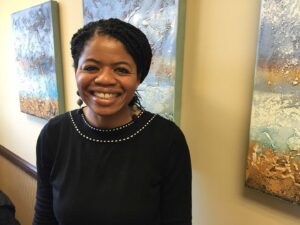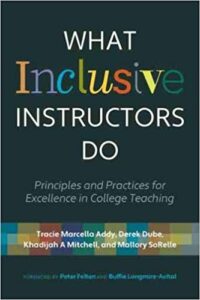What Inclusive Instructors Do
By Swati Pandey ’23
Tracie Addy still reminisces about her days as a student when her teachers came up to her and supported her regardless of the differences in their social identities. Tracie—associate dean of teaching and learning and director of the Center for the Integration of Teaching, Learning, and Scholarship—treasures her earlier moments of educational inclusivity as she seeks to make education inclusive and accessible at Lafayette.
 “Our classrooms consist of culturally and racially diverse, first-generation, low-income, and working-class students who can thrive with a sense of belonging and opportunities to contribute to the construction of knowledge,” she says. “That is why inclusive teaching is no longer an option but a vital teaching competency.
“Our classrooms consist of culturally and racially diverse, first-generation, low-income, and working-class students who can thrive with a sense of belonging and opportunities to contribute to the construction of knowledge,” she says. “That is why inclusive teaching is no longer an option but a vital teaching competency.
“Furthermore, the recent changes in teaching modalities due to the ongoing pandemic have exposed more inequities. The financial and social diversity of the students in a single classroom has been more pronounced, be it regarding the use of technology, access to WiFi, or a quiet place to work.”
 Tracie recently coauthored a book to guide faculty in creating classroom environments that help their students succeed: What Inclusive Instructors Do: Principles and Practices for Excellence in College Teaching, set for publication in April.
Tracie recently coauthored a book to guide faculty in creating classroom environments that help their students succeed: What Inclusive Instructors Do: Principles and Practices for Excellence in College Teaching, set for publication in April.
“Inclusive instruction works, and the evidence for its impact is overwhelming,” she says. “We also see our center initiatives helping faculty members advance their teaching efforts. Ninety-five percent of respondents from an assessment of the impact of the 2018-2020 Inclusive Teaching and Excellence series sessions conducted by CITLS indicated that the event or events they attended helped change their mindset, encouraged them to incorporate a new teaching strategy, or led to other benefits.”
Inclusivity is a core component of a Lafayette education, and Tracie is motivated to preserve and strengthen it.
“CITLS provides several resources to assist Lafayette faculty members in creating inclusive learning environments through our workshop series, the Inclusive Instructors Academy, website content, and even student-created media,” she says. “Our work is big on student voices, as learners can provide valuable insights to instructors and educational developers eager to make their classes more inclusive.”
“Writing this book—my first one—and having the opportunity to collaborate with other instructors such as Professor Khadijah Mitchell, who too are actively working for inclusive education, was a very rewarding experience. I hope to write more,” Tracie says.